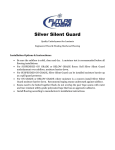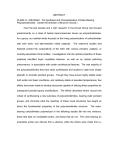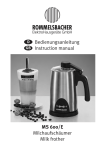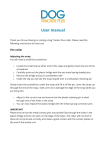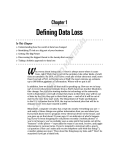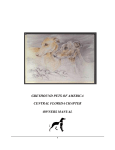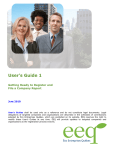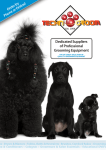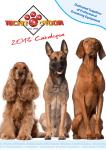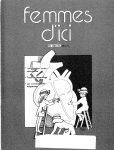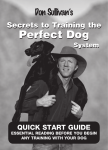Download Wenrick Shih Tzu Owners Manual
Transcript
Wenrick Shih Tzu Owners Manual Wendy & Richard Paquette Wenrick Registered Perm. Since 1971 Box 640 411 St Agnes St W Azilda ON P0M 1B0 Tel 705-983-2630 Fax 705-983-5147 E-mail [email protected] Web Site www.wenrick.ca I. INTRODUCTION A. Feeding Congratulations on your new Wenrick Shih Tzu. We wish you our very best with the special addition to your household. We have found our unique breed to be exceptionally trusting, loving, and playful. Shih Tzu want nothing more than to be with you and to be loved by you. Wenrick Shih Tzu have gained an International reputation as some of the world’s finest dogs and are sought after by discriminating breeders in many different countries. We also have Shih Tzu available as loving family pets.All Wenrick Shih Tzu come with a full health guarantee against any hereditary or congenital defects. Many owners consider the Shih Tzu to be a “big dog in a little package.” It is sturdy and heavy for its size and has an easy-going temperament. While each dog’s personality is unique, Shih Tzu in general have an almost human, childlike nature. They are sometimes described as “clownlike” or “catlike’ and have a strong nesting instinct (in chairs, couches, beds and laps). They would probably give a burglar a guided tour! Shih Tzu are intelligent, nonaggressive, and warmhearted givers of love. Because their purpose in life is to please and love you, you will best reach your training and bonding goals by using love, respect, and persistence. Shih Tzu have an ancient oriental heritage. Originally bred in the temples of Tibet, they were given as gifts to the Manchu emperors and were selectively bred as companion dogs by eunuchs in the imperial palaces in Beijing. Eventually they reached other countries (England, Norway, Sweden, Canada, France, and the United States). Like their human counterparts, Shih Tzu youngsters need to be fed more frequently than adults with food high in caloric and nutritional values because their bodies are growing, developing, and burning lots of energy. Fresh water should be available to your Shih Tzu at all times. Offering water in a 32 oz. water bottle for small animals is a widely used method for keeping faces and floors dry. The bottle should be mounted for easy and frequent access. Puppies (up to 6 months of age) should be fed two or three times daily; we prefer to have food available to the very young at all times and use a self feeding method. The amount of food given will need to be increased as your puppy grows. If he is cleaning his bowl, increase the amount; if he consistently leaves food behind, you are probably feeding too much.A puppy often goes “off its food” when it is teething, so check for swollen gums if appetite decreases. II. CARE AND MAINTENANCE In this section we will walk you through the steps of caring for and maintaining your Shih Tzu for optimal health, happiness, and a very long life (averaging 12-15 years) . The following is a general guideline for reference purposes. This material is taken from various sources and does provide some important information to get you started. Please call or contact as often as necessary if you have any concerns or problems. The basis of your dog’s diet should be a high-quality kibble, which is often moistened for the very young. We recommend you leave your puppy on the food we supplied you when you received your puppy. Generally it is either Purina Pro Plan Growth, Eukanuba Small Bites or Science Diet Growth. Regardless of the brand you select, keep in mind the nutritional ingredients, additives, and synthetic preservatives it contains, all of which can impact on the health of your dog. Table scraps are too rich for a Shih Tzu’s digestive system and may result in messy cleanup jobs, an unbalanced diet or a dog that holds out for gourmet treats rather than eating a healthy, well-balanced meal. This is not to say that an occasional piece of cheese, cooked meat, or vegetable will do harm, but use discretion and moderation as your key in offering human foods. Chocolate should be avoided, as it is toxic to dogs. Quality dog biscuits are good for teeth and gums, but rawhide chew toys often stick to Shih Tzu face furnishings and are therefore not generally recommended as treats. B. Grooming 1. Beginning Grooming Your puppy may initially resist grooming, but later the grooming period should be a special, intimate loving time for your puppy or adult. The ease and success of brushing, combing, nail clipping - and ear and eye checking and cleaning depends upon your patience, persistence, gentle training approach, and rewards. There is often a fine line to draw between firmness and loving and caring when handling and grooming our little sweethearts. A puppy must be comfortable enough to learn what is expected of him without becoming fearful. Each Shih Tzu has an individual personality that will affect his or her willingness to experience something new. Some may need sweet persuasion to accept a new grooming ritual, while others are simply in heaven because of all the attention they are receiving. DO NOT give in whenever your puppy resists, however, or the resistance will increase, and you will have an obnoxious matted dog. If you are patient, gentle, and persistent, your puppy will soon learn to enjoy your grooming time together. It is often helpful to clip nails, trim pads, and clean ears when your puppy is calm and slightly sleepy. 2. Basic Grooming Supply List Soft Slicker Brush Pin Brush with very flexible metal pins (brush in layers, separating mats with your fingers before brushing out) Combs: 7 1/2 “ teflon-coated comb with wide and medium tooth placement (use for face and feet and to check for mats after brushing); pocket-size fine-toothcomb Cat Nail Scissors or Human Toenail Clippers (for small puppies) Guillotine Nail Clippers (for older puppies and adults) Blunt End Scissors (for cutting topknot elastics and sensitive areas) Hair Scissors (for trimming) Tweezers or Ear Hemostat (optional) Ear Powder Polysporin eye drops or creme. Shampoo (quality shampoo acid-balanced for dogs , plus tearless shampoo for face) Conditioner (high quality product designed for double coated breeds) Flea Shampoo (mild, pyrethrin-based product Hair Dryer (hand-held or “hands-free” model Spray Bottle ( for conditioner mix-generally one teaspoon of conditioner mixed with one pint of warm water to dampen coat before brushing between baths) Latex Bands and Topknot Bows (for topknots) Quick Stop or Corn Starch Knitting Needle or Comb with Needle (for parts and -topknots) 3. Grooming Schedule Daily: Check for eye matter accumulation and remove it carefully with your fingers (without touching the eye) or with the pocket size fine-tooth comb. Brush and comb daily, being sure to brush in layers all the way down to the skin to remove any tangles and mats. Regular brushing is a must, as small mats left unattended quickly become large ones that are difficult to remove. As part of the grooming procedure, check the area around the anus for dried fecal matter. You may also wish to clean your dog’s teeth with a doggie toothbrush to prevent tartar buildup. If you notice excessive tearing and/or redness in the eye, check with your veterinarian. Unattended eye problems can rapidly become serious medical emergencies. See Exhibit B for instructions on Creating the Show Topknot. Every One to Three Weeks: It’s bath time. The best way to preserve a coat is to keep it clean. Dirty dogs are not only unsightly and uncomfortable, they mat more quickly. Before bathing your dog, brush and comb it thoroughly. Bathing “sets in” mats and makes them more difficult to remove. Before bathing, check the ears and remove excessive inner ear hair by applying ear powder and pulling the hair out. (The powder drys the hair and being careful not to spray water into the nose and mouth. A conditioner is also recommended. Blot up excess moisture with a towel and blow dry, brushing as you do so. Every 6 to 8 Weeks: To the daily procedures and bath, add a haircut if you do not choose to keep your dog in full coat. See ExhibitA for illustrations and instructions for a variety of haircut styles. allows it to be removed more easily.) Use tweezers or an ear hemostat (for the trained) or your fingers (for the untrained). Excessive hair in the inner ear canal blocks air circulation and provides a moist breeding ground for infection. Nails should be cut or trimmed level with the bottom of the foot pads—if the nails are clear, you can see the quick (pink), which will bleed if the nails are cut too short. Otherwise, cut to where the nail begins to curve under. Use Quick Stop or corn starch if you cut too short and bleeding occurs. Be sure to cut the dew claws, if any. Hair between the foot pads and the area around the anus should be trimmed short with scissors. Please use utmost care when trimming. Bathe the dog using a good shampoo on the body and a baby shampoo around the head...Scrub vigorously with your fingers the area around the face, nose and eyes and rinse thoroughly You will need to obtain good electric dog clippers with the types of blades named if you elect to do it yourself. Otherwise, use the material as a guide for your groomer. If you choose to keep your puppy or adult in full coat, this is the time to trim the hair around the foot in a layered circle and cut the side coat level with the ground. Ask your breeder to demonstrate this technique. Other: Some time between about 8 months and one year of age, almost every Shih Tzu “blows” its puppy undercoat. During this coat change, the dog seems to tangle almost as fast as you brush it. It is at this stage that many pet owners cut their dogs down. Do not despair! This is a one-time occurrence, and once the puppy undercoat is finally all brushed out, the adult coat is much easier to care for. C. Housebreaking, Training and Playtime 1. Housebreaking There are many methods used to housebreak new puppies or adults. Many Shih Tzu owners like to “dual train” to paper and outdoors. This means that if your dog has an attack of diarrhea, or if it is raining or snowing, or if you do not get home at the regular time to take the dog outside, there is a place in the house where it is acceptable for your dog to “potty.” If you lay a sheet of unprinted newspaper (available in rolls from a newspaper or in precut sheets from a wholesale paper supplier) over the newspaper, the dog will not get ink on its feet and track it across the floor. Another good product are washable, reusable “Pooch Pads” available at most pet stores. Some owners lay a teflon-coated floor grate meant for use in the bottom of an exercise pen (available from wholesale pet suppliers) on top of the newspaper; this keeps the dog from shredding the paper or getting its feet wet with urine. Gradually decrease the papercovered area as the dog learns what the paper is for. Confining a puppy to an area that is easily cleaned is best for initial training, This could be an area with linoleum, polycoated wood, or tile flooring. Puppies need to eliminate first thing upon awakening in the morning, immediately after eating, at noontime, in the early evening, and approximately twice in the later evening before bedtime. If you notice your Shih Tzu sniffing the floor and running back and forth or in a circular pattern, this is a sign to get the dog to the paper or outside so it knows that this is the appropriate spot to go. Once the mission is accomplished, praise the dog immediately. Should an accident occur, a harsh “No” and “Bad Dog.’ is effective for correction. Any correction should take place immediately to be effective—corrections long after the fact will only confuse the dog, Soon your Shih Tzu will know what pleases you by your voice tone and will want to eliminate in the appropriate spot. Use white vinegar or club soda to remove the odor if the dog has soiled the carpet so that the scent will not tempt him to repeat the performance. Never allow an unhousebroken dog the unsupervised run of the house—you are only asking for trouble. It’s much easier to instill correct behavior at the beginning than to try to get the dog to unlearn bad habits. Because dogs do not normally like to soil their beds, locating a crate in the area where you want your Shih Tzu to sleep and stay while you are away from home is an effective method of training. Put the dog outside or on the paper as soon as you take it out of the crate and praise it profusely when it eliminates. We recommend a small crate with cozy bedding and toys inside. The crate can be transported to your family room or bedroom or used in your car for trips around town. A water bottle can be hung on the crate. Soon your Shih Tzu will look upon the crate as its den. 2. Other Training It is important to remember that young puppies need lots of encouragement and patience as they mentally mature. Harsh physical corrections can have an adverse effect on their development and trust in people. The older dog needs to establish a close bond with its new owners, and the same positive approach to training should be employed, After all, the reason one acquires a Shih Tzu is for its unconditional love and companionship. Make a game of introducing a young puppy to the leash. Coax it to follow you with a squeaky toy or treat, or, initially, let the puppy walk you. If an excited puppy nips during playtime, a firm ”No Bite” and a calm “time out” will nip this behavior in the bud . Many people have had great success in obedience training Shih Tzu. Obedience training can improve the relationship between you and your dog and get it used to strangers and other dogs. Most people appreciate and are more accepting of well-mannered dogs. Many all- breed, clubs and school adult education programs offer classes for puppies and adults at reasonable prices. We will recommend a local class if you are interested. Even if you do not want to become involved in obedience competition, such classes are a good way to socialize your dog to people and strange dogs and to teach it to stay, come, heel, and sit on command. 3. Playtime Shih Tzu are always ready to play when you are, but if you are busy they will amuse themselves. They can spend hours throwing and catching their own toys, or racing around the house like furry dervishes. They love to chase soft balls or tug on old socks or soft latex toys, and they thoroughly enjoy walks around the neighborhood, Do remember that the fact that the Shih Tzu is not a demanding dog does not mean that it thrives in the absence of human companionship. Like any dog, it also needs regular exercise. Never leave your Shih Tzu outside unsupervised, as it can easily follow the friendly, smiling face of a stranger, eat something it should not, or perhaps take an unexpected dip in your pool. Shih Tzu do not generally swim well, and the weight of the waterlogged hair on a coated dog has been known to cause Shih Tzu to drown in swimming pools. If you have a secure fenced area, then periodic checking will do. Shih Tzu love children and other dogs, but please supervise playtime with young children and young puppies and be sure that the child is sitting down when playing with a puppy so the puppy cannot be accidentally dropped. Puppies and children need to learn how to interact with each other in a fun yet safe manner. 5 Tips To Housetrain Your Shih Tzu Puppy Tired of covering your carpet with newspaper? Follow these tips for hassle-free housetraining. 1. Use a Crate: A crate is a small plastic or wire travel cage similar to the ones airlines use to ship a dog. Dogs are den animals, especially small dogs that like a safe, secure place to call their own. The crate provides your dog with a bed of its own while preventing accidents--dogs do not want to soil where they sleep. Your puppy can stay in its crate through the night and for an hour or two during the day. Another handy place is a used mesh baby play pen....you may have one or can pick one up at a garage sale. 2. Restrict the dogs’s access throughout the house: When your dog is in the house with you, make sure it can’t sneak off to another room to have an accident. Keep your puppy close to you by closing doors, putting up baby gates or even having it on the leash with you. 3. Set up a schedule: Take your dog outside at regular times. It should go out first thing in the morning; after eating, play times and naps; and at consistent, regular intervals during the day. 4. Go outside with your dog: If you simply send your dog outside by itself, how do you know whether your dog has relieved itself? Go out with your dog, tell it, “Good dog, go potty!” and wait. When your puppy has done what needs to be done, praise the dog and bring it inside with you. If your dog doesn’t go, do not let it wander in the house freely or it will probably find a quiet spot to eliminate indoors. 5. Don’t correct your dog after the fact: If you find a puddle, don’t rub your dog’s nose in it or yell at it. If you catch your puppy as it’s squatting, yes, interrupt it and take it outside. Correcting after the fact is too late and can confuse the pup, simply clean up the mess and supervise your pup more closely. BE POSITIVE!!!!! D. Extended Trips Outings or trips away from home with your Shih ‘Tzu for an extended period of time need planning and preparation. We recommend taking your dog’s food dish with food, water bottle filled with your household drinking water or distilled water), leash, clean-up materials, grooming supplies, a doggie first aid kit and your veterinarian’s phone number (in case of an emergency). Remember, never leave your Shih Tzu in a car with the windows up during warm weather or in your car during periods of extreme cold. We recommend leaving your pet with us to be cared for professionally and safely at Wenrick Kennels. III. HEALTH A. Vaccination Record An inoculation record was given to you with your new Shih Tzu. The vaccination protocol is listed on this record which should be taken to the veterinarian with you on your first visit. Our vet gives puppy shots” (distemper, hepatitis, leptospirosis, parainfluenza, and parvo virus) at 8, 12 and 16 weeks of age, with a booster due once a year thereafter. The first rabies shot is usually given at 6 months, with boosters thereafter. In most parts of the country heartworm preventative tablets (the daily pills are preferred) are given during mosquito season. Please discuss all vaccinations given and the schedule for booster shots with your breeder and your veterinarian. The health record will also indicate when your puppy was tested for parasites and if and when it was wormed. Thereafter, take a stool sample in to be checked by your veterinarian annually or if symptoms warrant. B. Emergency First Aid Often we know there is something wrong with our pet’s health or condition but we cannot identify what it is or its cause. The Dog Owner’s Home Veterinary Handbook listed in our reference book section is a practical guide written for the layman which covers a wide variety of signs and symptoms of illness and disease. The first chapter is dedicated to emergencies. It also gives a list of items to assemble a “doggy first aid kit.” Such a book is a wise investment that could save you time and money when attempting to identify your Shih Tzu’s health problem and discuss it with your veterinarian. It could save your pet’s life in an emergency, although it is nota substitute for veterinary consultation and care. Be sure that the veterinarian you select is on call 24 hours a day or has links to a 24-hour emergency service.Among the common causes of poisoning in dogs acetaminophen, ibuprofen, chocolate, antifreeze, insecticides and a number of household plants (including dieffenbachia and philodendron) C. Breed-Specific Health Matters The Shih Tzu is one of many breeds sometimes affected by immune- related problems. TheASTC recommends thyroid function testing for any Shih Tzu exhibiting signs of thyroid malfunction. Such signs include hair loss, waxy and smelly ears, a greasy itchy skin that may develop patches of black pigment, lethargy, obesity, and irregular heat cycles, Another immune-mediated disease occasionally seen in ShihTzu isVon Willebrand’s disease (a blood-clotting deficiency); your veterinarian should therefore perform a toenail trimming test for clotting function before performing surgery. Testing for Von Willebrand’s disease may be performed on animals to be used for breeding. Certification for normal (nondysplastic) hips for animals to be used for breeding purposes by the: Orthopedic Foundation for Animals (OFA) is also desirable. The Shih Tzu has prominent eyes that may be easily injured. Therefore, be sure to check the eyes daily for redness, tearing, or other signs of irritation. It is also wise to have some polysporin eye drops or creme available as a first aid treatment. Place in the eye immediately upon seeing any irritation or injury. If you notice any problem, see your veterinarian immediately. Local dog clubs often sponsor low-cost CERF eye clinics in which dogs can have their eyes checked for various diseases, some of which can lead to blindness. We have most of the eyes of dogs used for breeding certified normal by CERF. spayed or neutered to eliminate the risk of unwanted pregnancy, messy heat cycles, strong behavioral urges to seek and breed and to help control the pet overpopulation problem. These procedures are normally performed after the puppy reaches 6 months of age. We suggest that you consult your veterinarian for his recommendations. In any event your pet puppy is on a Canadian Kennel Club Non B r e e d i n g agreement and can not be bred. Severe penalties and civil court action may occur if you knowingly breed your pet. Pregnancy can be a simply thing or American Canadian BIS BISS Champion could end up being Because Shih Tzu Wenrick’s Sweet Surrender complicated and have very short costly and result in muzzles, Shih Tzu puppies may snore, snort, or sniffle, particularly while the needless death of your family pet. teething, If the nasal discharge is watery and clear and the dog is thriving physically, this is no cause for concern. If you are interested in getting into the hobby of showing Missing or misaligned teeth or retained baby teeth are and breeding dogs please consult with us and we will also quite common, as are small umbilical hernias. Such encourage and mentor you to do it properly. Getting hernias almost always close naturally as the dog matures. involved and learning a great deal will be a prerequisite If not they can easily be repaired at the time of spaying to becoming a dedicated , responsible dog breeder. Dogs are an excellent family hobby but may not be for and neutering. everyone. Renal dysplasia, in which the kidney fails to develop normally, is an insidious problem affecting the Shih Tzu and several other breeds. A severely affected dog will vomit periodically, fail to thrive, drink excessive amounts of water, and have extremely dilute urine. Urine specific gravity, BUN, and creatinine tests will pinpoint the problem in a dog with very little remaining kidney function. An ultrasound scan of the kidneys will indicate if a dog has mildly affected kidneys but could pass the problem along to its offspring, and a scan or a kidney biopsy is recommended for breeding animals. PLEASE, PLEASE, PLEASE CALL US BEFORE YOU SPEND MONEY AT THE VET. IF YOU NEED TO VISIT THE VET WE WILL SO ADVISE YOU BUT MANY PROBLEMS CAN BE RESOLVED WITHOUT THE TIME AND EXPENSE OF A VETERINARY VISIT. USE YOUR COMMON SENSE!!!!! Wenrick Health Guarantee Pets On CKC Non Breeding Agreement Wenrick dogs have been seen by a veterinarian, have had at least their first needles and have been checked for internal & external parasites. They should be healthy and are guaranteed against any hereditary and congenital defects. If for any reason you have a concern that your puppy has a health problem, you must contact us immediately before any treatment or procedures are carried out by your veterinarian. If a serious problem occurs we will replace the puppy if it is returned to us. Should you not wish to return the dog to us, we may consider some form of financial compensation, but in any event is limited to the original purchase price only. If your puppy dies, a post mortem must be performed by a veterinarian. Show And Breeding Dogs As well as the above stated guarantee all show puppies are sold on a satisfaction guarantee. This means that your dog may be returned at any time for a replacement up until the time you attempt to use it for breeding, providing it is in show quality coat for it’s age. All shipping expenses to be the responsibility of the buyer. Pet Insurance All pets sold under the age of 6 months in Canada are covered for the first 6 weeks by the Pet Plan Insurance Company. The coverage is outlined on the Voucher you received with your puppy and includes,accident, illness or death benefits. You should read the material that will be sent to you at our request by the Pet Plan Insurance company and consider enrolling your pet for a lifetime of coverage. If you have any questions regarding your coverage for the first 6 weeks or future coverage, please call Pet Plan @ 1-800-268-1169. Coverage Limits 80 % of veterinary fees resulting from Up to $ 750. for the 6 week period accident or illness, excluding the first valid at any veterinary practice. $ 50. per condition (the deductible) Advertising and reward Up to $150. for approved advertising and reward if your dog is lost or stolen Death from accident or illness $250.














